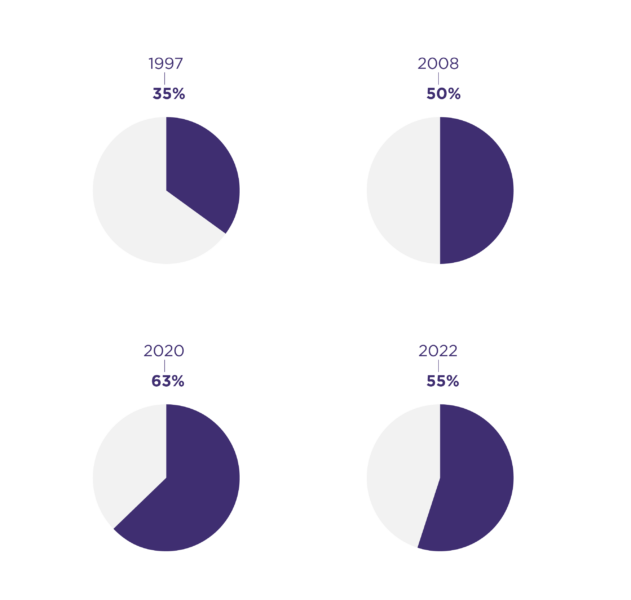
What is the most demanded characteristic of an effective corporate leader today? Three scholars who have followed the behavior of those in command in organizations for decades have arrived at versatility, a rare competence that can be apprehended.
Based on their own tool, the authors of the work, recently published in the Harvard Business Review, from Harvard University, conclude that less than 10% have the ability to balance strong and enabling leadership, or strategic and operational leadership. The conclusion is based on surveys with more than 24,000 leaders and was reached particularly from the transformations left by the pandemic.
The tool created for assessment, based on 360-degree assessments, is the Leadership Versatility Index, which measures the importance of this characteristic in decision-making. From the late 1990s through 2008, versatility accounted for just over a third of the variability in leadership effectiveness. (see chart). During the first year of the pandemic, it skyrocketed to nearly two-thirds. From then on, it dropped a little, but without returning to pre-Covid-19 levels.
The researchers responsible for the study are Rob Kaiser, president of the management consultancy that bears his name; Ryne Sherman, former professor at Florida Atlantic University; and Robert Hogan, former professor of psychology at Johns Hopkins University.
Ratio of overall leadership effectiveness related to versatility

Paths for the leader to become more versatile
And what is the skill assessed in the case of the study? The authors define it as the ability to “read” and respond to changes with a wide repertoire of behaviors. It is the component that leaders need particularly when they have to take charge alone and make difficult decisions – a common situation during the pandemic.
One of the aspects emphasized by the study is that versatility is the most valued characteristic for those who need to lead in a world characterized by volatility, uncertainty, complexity and ambiguity. As the vast majority do not have this characteristic, many leaders prefer to share difficult decisions with professionals seen as versatile.
Research on the links between personality and leader behavior suggests that versatility is largely a learned ability. In addition, it is a meta-competence, that is, it reflects a balanced and complete pattern of competences that suggests an underlying ability to master specific skills and behaviors and enable the continuous learning of new ones.
There are many ways for a leader to become versatile, depending on their personal traits, but three principles apply to all. Are they:
1. Understanding trends as a boss, about which behaviors are natural and which will be learned.
2. Identity evolution or the story you “tell” yourself, about who you are.
3. Greater balance of skills and talents. In this case, it is important to be able to know which one to use in decisive moments.
Those who have a wide and balanced repertoire of complementary skills, abilities and behaviors, in addition to knowing how to use them effectively at the right time, will always be better prepared to face difficult times. And the great advantage is precisely that this meta-competence – versatility – can be learned, trained and developed. Experiences of strategic decisions that demonstrate the impact of versatility have been reported here at Reputation Feed in interviews with leaders such as Rogério Melzi, adviser to several organizations, Julio Mottin Neto, CEO of Panvel, It is Fred Wagner, CEO of Track&Field, for example. Making tough decisions can be easier with successful examples to look to.


